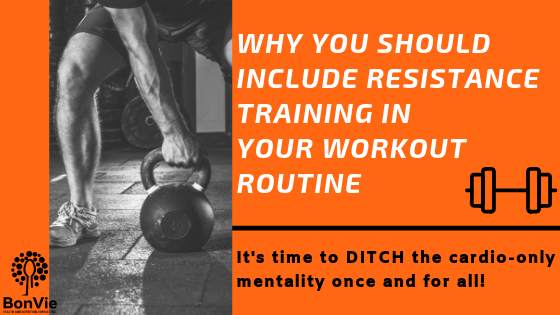
20 Sep Why You SHOULD Include Resistance Training in Your Workout Routine
It is time to end the cardio-ONLY mentality, once and for all!
Have you ever been stuck in a gym routine composed of entirely cardio? Have you ever felt like you NEEDED the cardio after a weekend of indulging a bit too much? Have you ever felt “bad” for missing out on a cardio session because your body was too tired for one?
The push for cardio as a method to achieve fat loss (especially for women who are afraid to “bulk up” from myths that persist about resistance training) may explain why you might feel pressure to get on the treadmill.
Many people have become obsessed with tracking their calories IN (food consumed) and calories OUT or burned (in the form of cardio or other forms of exercise). Although cardio can be extremely helpful in assisting with fat loss, the obsession over calories IN and OUT is a slippery slope that could lead to exercise addiction or under consumption of calories to “compensate” for over-indulging. It is a much BETTER approach to include exercise from a variety of sources, not exclusively cardio. Resistance training and cardio both burn calories AFTER a workout too, so the calories displayed on watches, fitness trackers, and cardio machines (i.e. your calories burned during your workout) don’t usually tell the true story.
Dropping the cardio-only approach to exercise will allow you to let go of the calories in and calories out mentality, prevent your body from burning out and getting used to just one type of exercise and help you to focus on activities that make your body feel good. It is time to let go of the numbers game and includes some resistance training in your routine!
The inclusion of resistance training is the game-changer you need to help you reach your health goals in the short term AND in the long-term. With a healthy balance of diet, cardio, and resistance training, you will have much greater success for your health and weight goals than someone who does cardio alone!
Also, who doesn’t want to feel like a strong badass?! When you feel strong physically, you feel stronger mentally and emotionally, too! I always say that working out with resistance training is my “mental health pill” because it has single-handedly rescued me from my struggles with anxiety and depression at various times in my life.
What Is Resistance Training?
Resistance training involves working against a weight or force in order to increase muscle size and strength, leading to a faster and more efficient metabolism. Don’t worry about increasing your personal size though – muscles that are stronger are leaner and tighter – and thanks to hormones, while men gain size from resistance training, women get smaller.
Resistance training could include free weights, weight machines, resistance bands, resistance tubes, and bodyweight workouts. The greater amount of resistance training you include in your weekly routine, the more muscle development you will likely achieve.
How Does Resistance Training INCREASE Overall Calorie Burn?
The more lean muscle mass you have, the more calories you need to maintain those muscles and support your metabolism. Simply put… the more muscles you have, the more calories you burn at rest. This is why athletes often have to consume an enormous amount of calories to maintain their body composition. The more muscles you have, the more you can eat without fat gain and the hungrier you will likely feel. On the other hand, doing too much cardio and not eating enough calories can damage your metabolism, meaning your muscles will atrophy. Muscles need FOOD to be supported and kept strong.
What Other Benefits Does Resistance Training Provide that Cardio DOES NOT?
Resistance training increases bone density, muscle strength, and joint strength, while also improving flexibility, balance, stamina, mobility, and posture at any age! Cardio alone won’t get you any of these benefits because cardio can’t change your body composition. Resistance training can benefit those with chronic pain or mobility issues; help to prevent and reverse osteoporosis; and can lead to injury prevention by strengthening muscles, bones, and joints; and reducing stress on connecting tendons.
Like cardio, strength training also releases endorphins that can support mental health and prevent depression. Resistance training can also prevent cognitive decline in those who are older. Since the activity increases blood flow to the brain, research has shown there is a correlation between resistance training and overall cognitive health.
Although cardio undoubtedly burns more calories during your workout session, it should be enjoyed in moderation and not be taken to the extremes. Weightlifting or resistance training can help you to burn more calories THROUGHOUT the day, everyday. A balanced workout routine that includes cardio, resistance training, and flexibility/stretching is the most optimal choice for someone seeking to lose fat, increase strength, and improve their health now and in the future.


No Comments